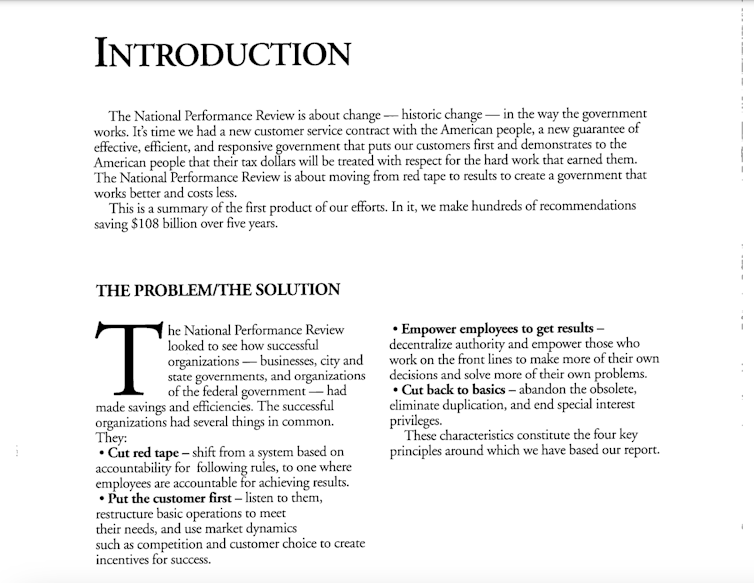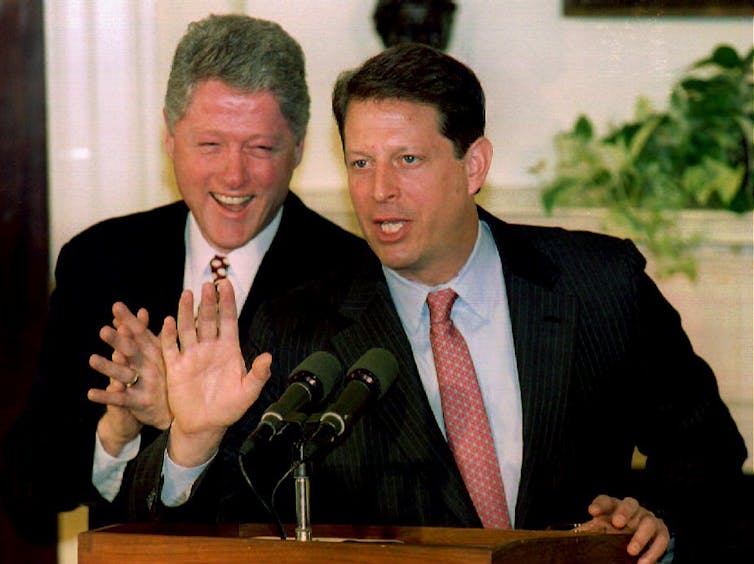As President Donald Trump issued a slew of government orders and directives on his first day of his second administration, he defined his actions by saying, “It’s all about common sense.”
For over a century, presidents have pursued initiatives to enhance the effectivity and effectiveness of presidency, couching these efforts in language much like Trump’s.
Many of those, like Trump’s Division of Authorities Effectivity, which he appointed billionaire Elon Musk to run, have been designed to capitalize on the experience of individuals exterior of presidency. The concept usually cited as inspiration for these efforts: The non-public sector is aware of tips on how to be environment friendly and nimble and strives for excellence; authorities doesn’t.
However authorities, and authorities service, is about offering one thing that the non-public sector can’t. And outsiders usually don’t take into consideration the accountability necessities that the legal guidelines and Structure of america impose on authorities employees and businesses.
Congress, although, can assist tackle these issues and examine inappropriate proposals. It could actually additionally stand in the best way of reform.
Charles E. Merriam, left, and Louis Brownlow, members of the President’s Reorganization Committee, depart the White Home after discussing authorities reorganization with President Franklin D. Roosevelt on Sept. 23, 1938.
Harris & Ewing, photographer, Library of Congress
Proposing reform is nothing new
Maybe essentially the most well-known group to work with a president on bettering authorities was President Franklin D. Roosevelt’s Committee on Administrative Administration, established in 1936.
That group, generally known as the Brownlow Committee, famous that whereas critics predicted Roosevelt would carry “decay, destruction, and death of democracy,” the manager department – and the president who sat atop it – was one of many “very greatest” contributions to fashionable democracy.
The committee argued that the president was unable to do his job as a result of the manager department was badly organized, federal workers lacked abilities and character, and the price range course of wanted reform. So it proposed a sequence of modifications designed to extend presidential energy over authorities to reinforce efficiency. Congress went together with a few of these proposals, giving the president extra employees and authority to reorganize the manager department.
Since then, nearly each president has put collectively related suggestions. For instance, Presidents Harry S. Truman and Dwight D. Eisenhower appointed former President Herbert Hoover to steer advisory commissions designed to advocate modifications to the federal authorities. President Jimmy Carter launched a sequence of presidency enchancment initiatives, and President George W. Bush even created scorecards to rank businesses in accordance with their efficiency.
In his first time period, Trump issued a mandate for reform to reorganize authorities for the twenty first century.
This time round, Trump has taken government actions to freeze authorities hiring, create a brand new entity to advertise authorities effectivity, and provides him the flexibility to fireside high-ranking directors who affect coverage.
Most presidential proposals typically fail to return to fruition. However they usually spark conversations in Congress and the media about government energy, the effectiveness of federal applications, and what authorities can do higher.
Most presidents have tried the identical factor
Traditionally, most presidents and their advisers – and certainly most students – have agreed that authorities forms shouldn’t be designed in ways in which promote effectivity. However that’s intentional: Stanford political scientist Terry Moe has written that “American public bureaucracy is not designed to be effective. The bureaucracy arises out of politics, and its design reflects the interests, strategies, and compromises of those who exercise political power.”
A typical presidential response to this sensible actuality is to suggest authorities modifications that make it look extra just like the non-public sector. In 1982, President Ronald Reagan introduced collectively 161 company executives overseen by industrialist J. Peter Grace to make suggestions to remove authorities waste and inefficiency, based mostly on their experiences main profitable firms.
In 1993, President Invoice Clinton licensed Vice President Al Gore to launch an effort to reinvent the federal authorities into one which labored higher and value much less.
The Clinton administration created groups in each main federal company, modeled after the non-public sector’s effectivity requirements, to maneuver authorities “From Red Tape to Results,” because the title of the administration’s plan mentioned.

An introductory web page from the 1993 Nationwide Efficiency Evaluation government abstract, commissioned by the Clinton administration.
CIA.gov
Presidential makes an attempt to make authorities look and work extra like folks assume the non-public sector works usually embrace changes to the phrases of federal employment to reward workers who excel at their jobs.
In 1905, for instance, President Theodore Roosevelt established a Committee on Division Strategies to look at how the federal authorities might recruit and retain extremely certified workers. 100 years later, federal businesses nonetheless skilled challenges](https://www.gao.gov/belongings/gao-03-2.pdf) associated to hiring and retaining individuals who might successfully obtain company missions.

President Invoice Clinton applauds as Vice President Al Gore speaks at a press convention on March 3, 1994, at which Gore gave Clinton a report of the Nationwide Efficiency Evaluation.
Paul J. Richards/AFP by way of Getty Photographs
So why haven’t these plans labored?
No less than the previous 5 presidents have confronted issues in making long-term modifications to authorities.
Partly, it is because authorities reorganizations and operational reforms like these contemplated by Trump require Congress to make changes to the legal guidelines of america, or a minimum of give the president and federal businesses the cash required to spend money on modifications.
Think about, for instance, presidential proposals to spend money on new applied sciences, that are a big a part of Trump and Musk’s plans to enhance authorities effectivity. Since a minimum of 1910, when President William Howard Taft established a Fee on Economic system and Effectivity to handle the “unnecessarily complicated and expensive” manner the federal authorities dealt with and distributed authorities paperwork, presidents have really helpful centralizing authority to mandate federal businesses’ use of latest applied sciences to make authorities extra environment friendly.
However remodeling authorities by means of expertise requires cash, folks and time. Presidential plans for government-wide change are contingent upon the diploma to which federal businesses can efficiently implement them.
To sidestep these issues, some presidents have proposed that the federal government work with the non-public sector. For instance, Trump introduced a three way partnership with expertise firms to spend money on the federal government’s synthetic intelligence infrastructure.
But as I’ve present in my earlier analysis, authorities funding in new expertise first requires an evaluation of businesses’ present technological abilities and the influence expertise can have on company features, together with these associated to governmental transparency, accountability and constitutional due course of. It’s not sufficient to exit and purchase software program that tech giants advocate businesses purchase.
The issues that authorities businesses do, comparable to regulating the economic system, selling nationwide safety and defending the surroundings, are extremely sophisticated. It’s usually laborious to see their influence immediately.
Recognizing this, Congress has designed a fancy set of legal guidelines to stop political interference with federal workers, who have a tendency to take a look at issues long run. For instance, as I’ve present in my work with Paul Verkuil, former chairman of the Administrative Convention of america, Congress deliberately writes legal guidelines that require sure authorities positions to be held by specialists who can work of their jobs with out worrying about politics.
Congress additionally writes the legal guidelines the federal workers administer, oversees federal applications and decides how a lot cash to acceptable to these applications every year.
So by design, something labeled a “presidential commission on modernizing/fixing/refocusing government” tells solely a part of the story and units out an unimaginable job. The president can’t make it occur alone. Nor can Elon Musk.



